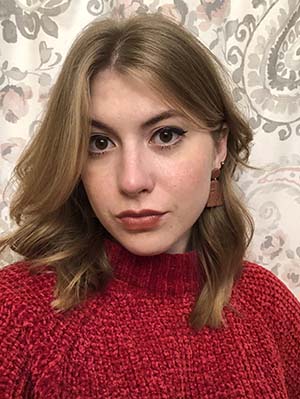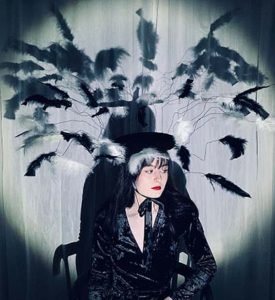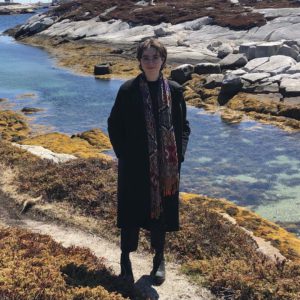With graduation 2021 almost here, we’re highlighting a few of the students finishing their time at King’s. We applaud the hard work and dedication shown by the entire Class of 2021 and we wish them great success and fulfillment!
Eliza Wolfe, Bachelor of Arts with a combined honours in Early Modern Studies and Political Science, and a certificate in Art History & Visual Culture
In Eliza Wolfe’s second year studying Political Science and Great Books at St. Thomas University in her hometown of Fredericton, N.B., she began to research the Early Modern Studies Program at King’s. Wolfe was enjoying her studies at St. Thomas—she notes the amazing students she met there—but she was intrigued by the idea of attending a university where each program has a strong foundation in the humanities.
“I was drawn to [the idea of] a place where everyone was interested in that sort of thing,” Wolfe says. “And the Early Modern Studies program particularly … during my second year I would research for fun what it was all about and I was so intrigued by the course offerings and the fact that they had art history—I thought that was really unique, because not many universities in Atlantic Canada have that visual art element.”

Eliza Wolfe
Wolfe moved from Fredericton to Halifax and became a King’s student at the start of her third year. Now, Wolfe is about to graduate with a Bachelor of Arts with a combined honours in Early Modern Studies and Political Science and a Certificate in Art History and Visual Culture.
Asked what it was like to begin studying at (another) small university part-way through her degree, Wolfe says the community helped her settle in easily.
“It wasn’t difficult because my classmates were friendly, professors were friendly, and I feel like that sort of compensated for the difficulty of […] moving to a new city.”
As soon as she arrived at King’s, Wolfe took advantage of the opportunity to pursue another interest, sacred music. She immediately joined the King’s Chorus, and the following semester she secured a role in the student assistant program doing promotional work for the Chapel Choir.
“That was really fun because I got to create social media content for them, film their services, and put them on Instagram […] I just love sacred music—which I think is a unique thing that King’s has going for it.”
Dr. Simon Kow’s course Conceptions of State, Society and Revolution in the Early Modern Period was a highlight of her studies, and influential too. As she prepares for graduate studies in Political Science at the University of New Brunswick in the fall, Wolfe says that it was courses such as the latter that helped her to identify a research focus that will inform her next step.
“I think this year was really formative and sort of steered me in the right direction. My thesis topic was very political theory-based. It was on Rousseau and the artificiality of civil life. So I feel like all of that primed me for what I’m doing afterwards, which is awesome.”
Cameron Constantine, Bachelor of Arts, Early Modern Studies
“One of the biggest epiphanies I had was discovering that I wanted to go into Early Modern Studies,” says Cameron Constantine. Constantine came to King’s after learning about the Foundation Year Program as a high school student in Moncton, N.B.

Cameron Constantine wears a hat of his own design. Titled “At the Hunt,” it is “inspired by English hunting attire from Charles I to Charles, Prince of Wales.”
After the Foundation Year Program (FYP), Constantine took a year off. When he returned, he enrolled in a variety of courses at King’s and Dalhousie, including the first Early Modern Studies Program core class, and some English courses focused on poetry from the early modern period.
“Discovering a passion for that period was really important,” he says. “When I was taking that first English course […] we started with [John] Donne and the early Renaissance, and I really developed something of an obsession with Donne. I was very passionate about his work and I wrote a lot on him.”
This interest in Donne led one of his professors to recommend he read some John Milton, whose work would ultimately become the subject of his honours thesis.
Asked how he feels about Milton’s work after having been immersed in it for months, he observes, “It’s kind of like listening to someone tell a really long story. You know? You’re entertained but you kind of want them to stop talking at the same time… I mean, I still love Milton,” he laughs, continuing “I think that the really fascinating thing about writing a thesis is that you go in thinking that you think certain things about a topic, and you either confirm that, or you find out that you actually think different things….
“I think that’s how you get the most out of writing a thesis—to go about it very honestly and not try to confirm things that you no longer believe. You know, it’s okay to discover that you had it wrong.”

Model wears hat by Constantine
In addition to an impressive knowledge about Milton, Constantine says he’s also graduating with stronger writing and presentation skills—abilities he thinks are taught particularly well at King’s, and in the Early Modern Studies Program in particular.
“One thing that King’s does better than most schools […] is correct and polish students’ writing. I just think that the value of good writing in the workplace—in whatever field you’re going to be in—is undervalued.
As graduation approaches, Constantine is focused on another set of skills, but he’s still rooted in the Early Modern period. He has launched a fashion brand named Constantine, making hats, accessories and womenswear.
“Certainly the research skills that I’ve learned are invaluable to doing research for a given hat or look,” he says. “And you know I draw a lot of inspiration from the early modern period because I am so passionate about it.”
Em Grisdale, Bachelor of Arts with a combined honours in Early Modern Studies and English, Certificate in Art History and Visual Culture
“I didn’t know that I was interested in studying art history until my second year.” says Em Grisdale. “Learning that this was an option and that if I really liked something I could somehow make a career out of it was very freeing.”
This month Grisdale, who comes from Burlington, Ont. originally, will graduate with a Bachelor of Arts, with a combined honours in Early Modern Studies and English, and a Certificate in Art History and Visual Culture. They have found their studies deeply satisfying.
“This is going to sound very nerdy,” Grisdale begins, “but I just love learning and I love being a student. I think that the student experience at King’s is super-special. Because it’s so small, you get to have a community of learners, which I really enjoyed.”

Em Grisdale
Grisdale was very involved with campus life at King’s, participating in the Early Modern Studies Society, the King’s Theatrical Society, and the King’s PRIDE Society, too.
Among the highlights of their time was traveling to Florence with the Early Modern Studies program’s Study Abroad course.
“It puts this zest in you. I just wanted to create and read and absorb all of the art and beautiful architecture that I could. It really enchanted me.”
The trip also planted the seed that became their honours thesis.
“In Florence we did a curatorial project in which we had to pick a central theme to […] create an exhibit. And the theme that my group went with was Divine Women and Divine Light.
“I’m very interested in how artists depicted women in the Renaissance and in the Baroque periods, and I’m very interested in colour theory and light…. I knew that I wanted to write about some sort of synthesis of those three things […] So I wrote on Titian…. I argue that he purposefully painted women in liminal spaces […] inspiring desire that works on multiple levels to create these liminal depictions of women that are tricky and fun to look at and beautiful.”
Grisdale will explore this subject in greater depth as a graduate student at McGill, where they will begin a Masters degree in Art History in the fall. Their time at King’s has helped them to develop a confidence that will be invaluable going forward.
“Being confident in my writing is something that is so valuable to me and it’s something that I’ve been developing over the past four years,” they say. “Not doubting what I know and not doubting the way that I’m saying it. And […] trusting that I’m conveying what I want to convey in a way that people will enjoy.”
Join us on May 27 to honour and congratulate the Class of 2021! The celebration will be shared on Facebook and YouTube May 27 starting at 3 p.m. AT. Learn more.

